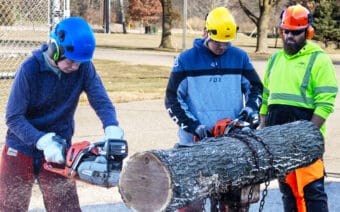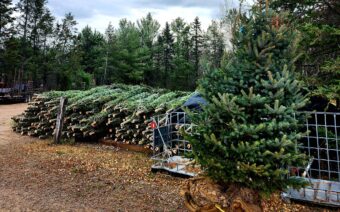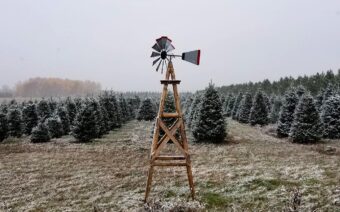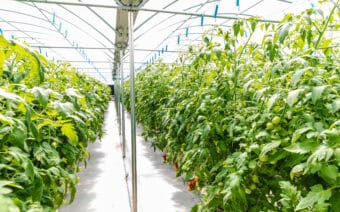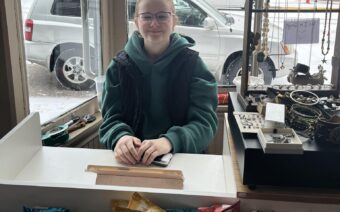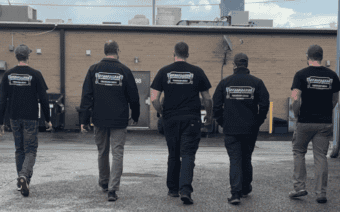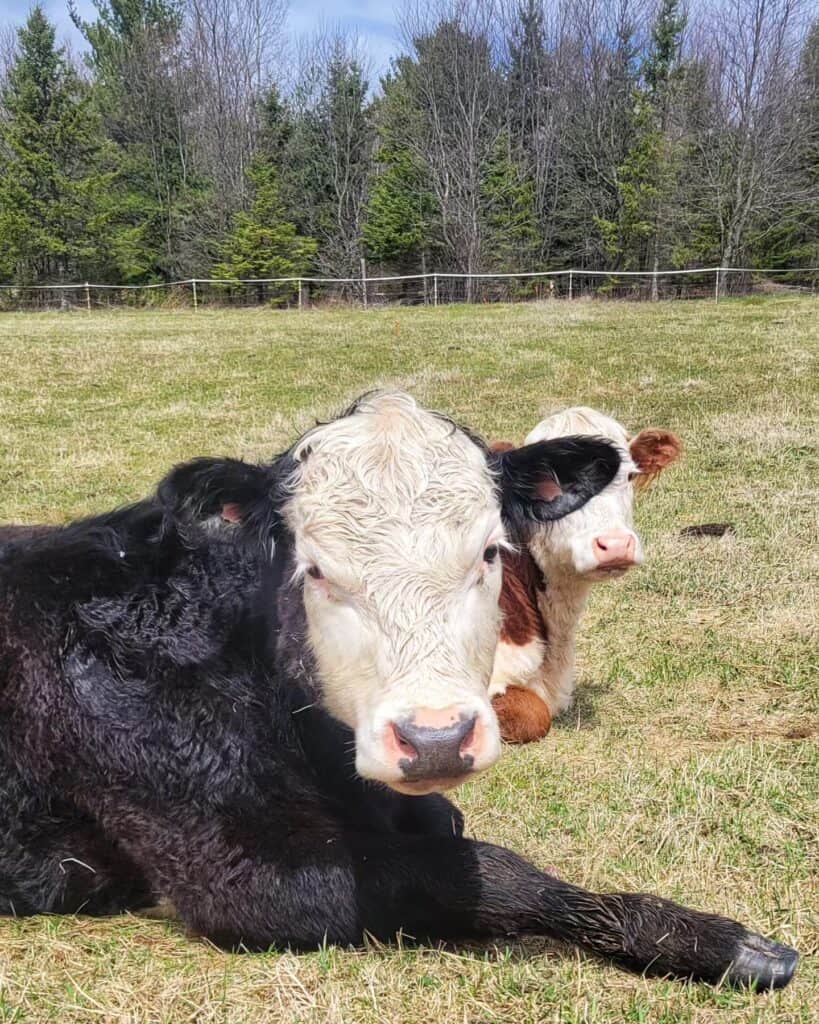
June 9, 2025
GLEASON – Both graduates of Michigan Tech University and engineers, Mary and Devlin Huhta said had you told them a decade ago that they would not only move to farmland in Gleason, but start and sustain a homestead – “I would have never believed you.”
“Neither of us grew up on a farm,” Mary said. “I grew up rural just outside of Stevens Point, but definitely not farming.”
Meeting while attending Michigan Tech, Mary said she and Devlin “did the whole engineering shtick for a while after graduation.”
“We kind of accidentally started farming – which sounds cliche, but it really started with just a few chickens and a garden that grew to be way too big for us,” she said.
Mary said Huhta Homestead (N5136 Town Hall Road) started as a way for her family to become more sustainable, and it “just kind of took off from there.”
“When we moved to our farm in Gleason, we got two feeder calves for ourselves and our family,” she said. “Then we had friends who wanted (some), so we essentially expanded.”
Mary said the most important thing for her, Devlin and Huhta Homestead, was sustainability – both in how they farmed and how they grew the farm.
“We’ve been trying to slowly grow it sustainably,” she said.
Furthermore, Mary said they have worked with the Natural Resources Conservation Service (NRCS) in an effort to implement even more sustainable practices on the farm.
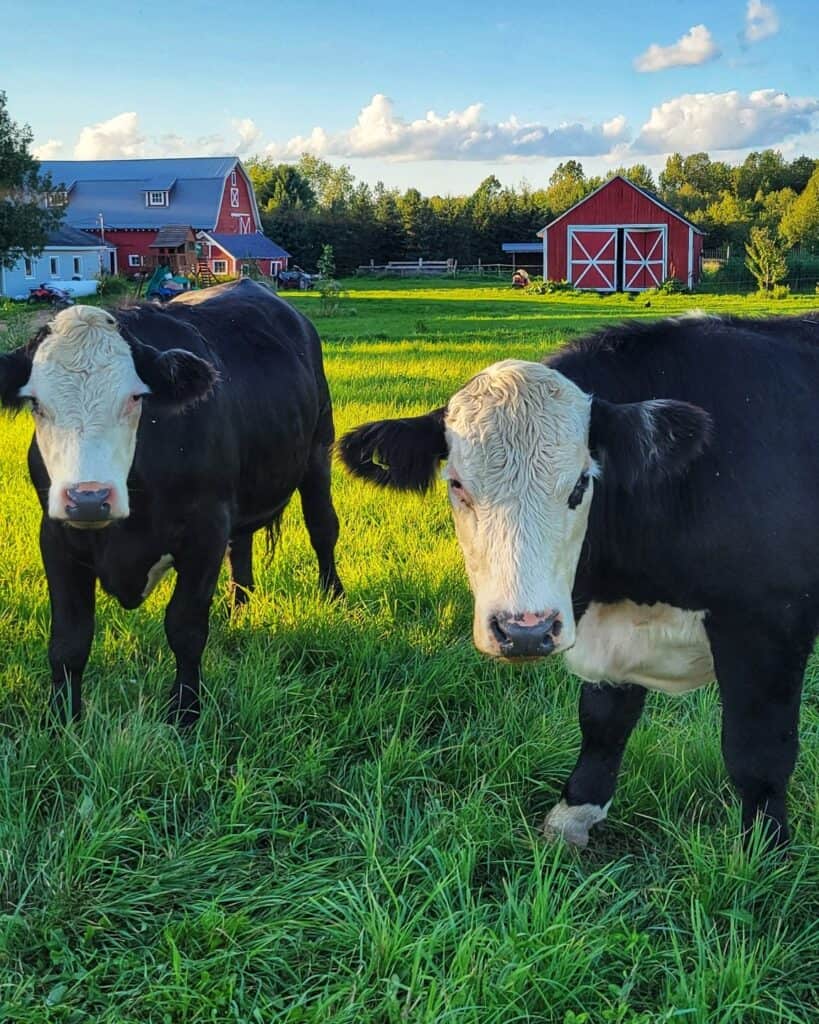
“Essentially, trying to preserve those natural resources that we already have at our farm – so the soil, the water,” she said. “The NRCS has been really helpful as far as helping us get grant money and resources to be able to put in extra pasture land that we can rotate our cattle on – which is overall better from a pasture health standpoint. That has been huge for us and has allowed us to expand a lot more.”
Customer experience, relationships
Having a farm-to-table focus at Huhta Homestead – which allows customers to know exactly where their food is coming from – Mary said, is important because they were once those customers.
“Before we had a farm, that was important to us as customers,” she said. “We tried to get food that was as close to us as we could for a myriad of reasons. We wanted to support our local economy, and we felt better being able to actually ask the people we were getting our meat from ‘what is in it? How was it raised?’”
Now offering fully grass-fed beef to its customers themselves, Mary said, provides them an opportunity to have those same conversations.
Since expanding operations a handful of years ago to extend their efforts beyond just focusing on feeding themselves and their family and friends, Mary said getting to know Huhta Homestead’s customers “has been one of my favorite things.”
“I like getting to know my customers, seeing how much they appreciate our products and how much of an impact it actually has on their families,” she said. “It’s a one-on-one relationship, if you will. We have had folks say, ‘We’d kind of given up on eating beef, it wasn’t good anymore. But then we found yours, and we’re going to start eating beef again.’”
All Huhta Homestead beef, Mary said, is processed at M & T Meats in Sheldon.
“We found them through a friend of a friend, and they’ve been doing an amazing job with our beef for the last five years,” she said.
Those customers who do meat shares – quarters, halves, etc. – Mary said they can pick up their cuts right at the butcher, while they bring the retail cuts back to the farm.
For the farm’s meat chickens, Mary said they work with Mekong Fresh Meats in Mosinee.
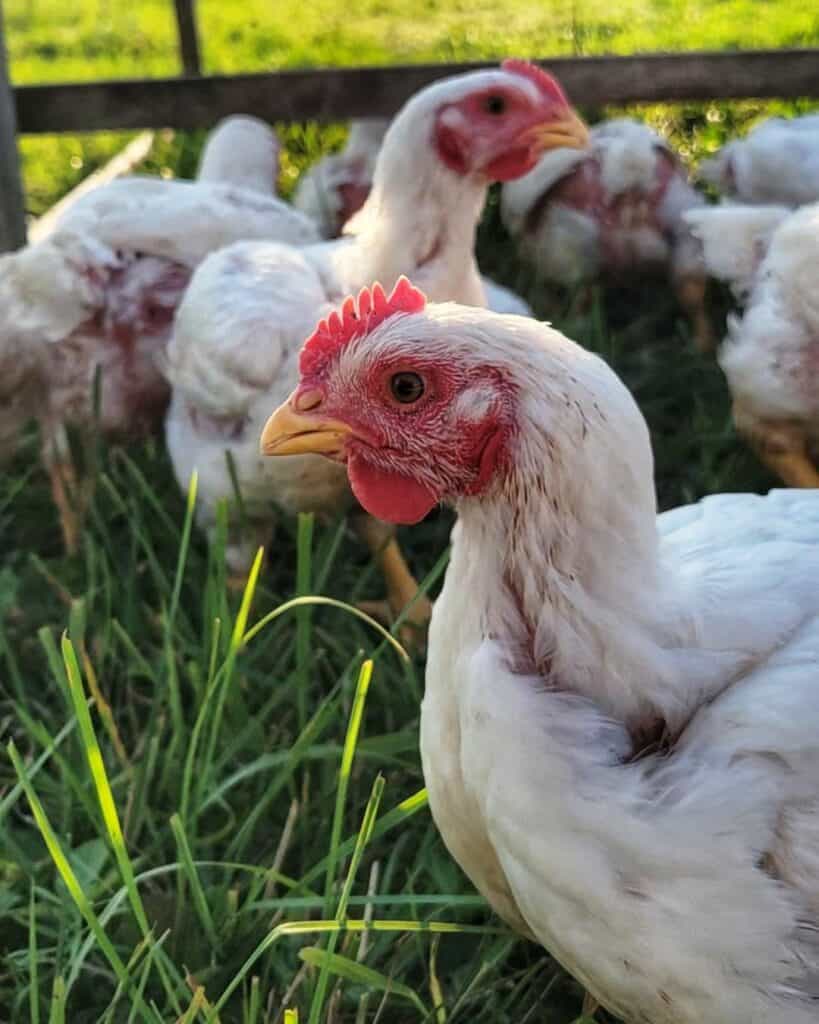
“Previously, we did the chicken processing ourselves on the farm, which was nice, so we controlled every step,” she said, “but then we couldn’t sell it at markets – so it really cut down on being able to offer it to customers other than at the farmstand.”
Getting the word out
Though she didn’t grow up on a farm and had no real farm experience until she and Devlin took the leap themselves, Mary said, surprisingly, it isn’t “the farm work” that’s presented a learning curve.
“The hardest part for me – coming from a black-and-white engineering background – is the marketing,” she said. “We are getting better at it, but every day is an experiment of what is going to work and what isn’t going to work. Honestly, for me, that is the hardest part.”
That being said, Mary said the local food movement “has been incredible.”
“You meet a lot of really neat people who have that same drive,” she said.
Getting the word out about Huhta Homestead, what it is and what it has to offer, Mary said, is supported by the farm’s website, social media platforms, on-site farmstand and local farmers’ markets – one of which Mary was on her way to while taking part in The Business News interview.
Huhta Homestead’s farmstand, she said, has fixed hours from 9:30-11 a.m. every Saturday.
“Folks can either pre-order and pick it up then, or they can just show up and buy what they want,” she said.
Mary said Huhta Homestead also does product pick-up by appointment.
“So, if somebody is really wanting five pounds of burger, I’m happy to put that together, and they can pick it up,” she said. “We are pretty flexible.”
Online ordering at huhtahomestead.com, which Mary said can be arranged to pick up during those Saturday hours or another time that is convenient for the customer.
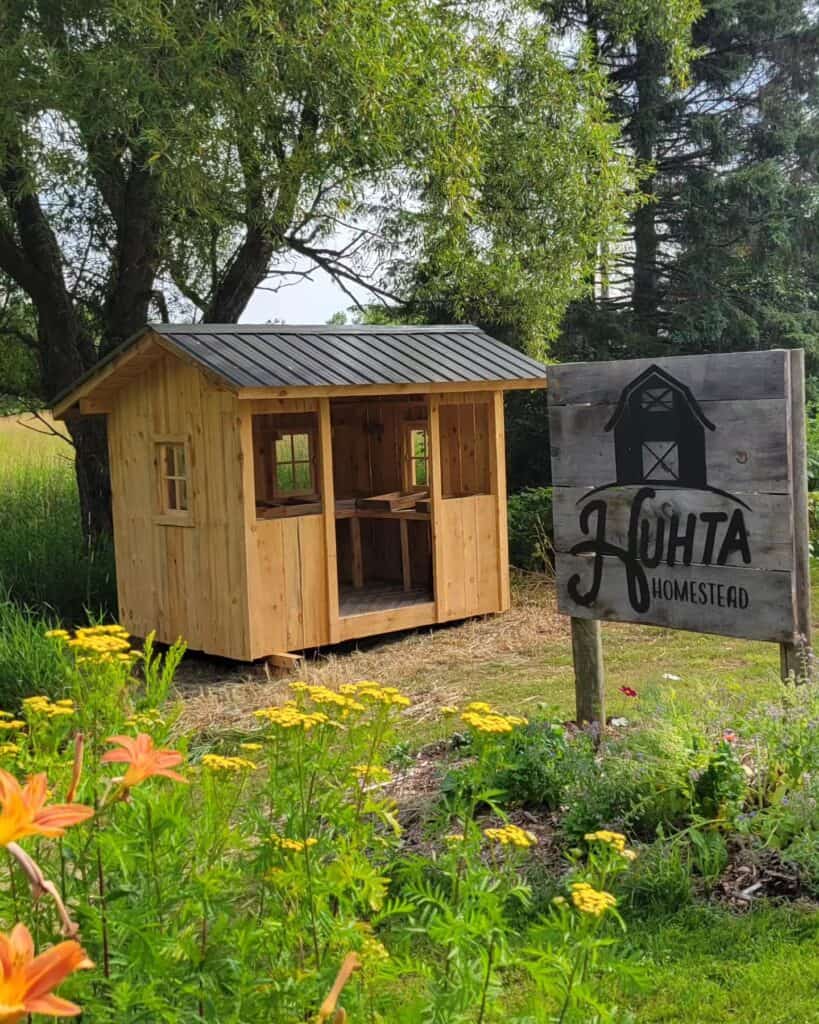
“As far as markets, we do the Wausau Night Market every summer,” she said. “That’s one night in June, July, August in the downtown 400-block area. And new this year, we are going to the Minocqua and Eagle River markets, again once a month – so, we’ll see how that goes.”
Available for purchase at the markets, Mary said, are Huhta Homestead beef, chicken, maple syrup – which they also purchase on the farm – and tallow bars.
“Shockingly, we have a lot of tallow from our cows,” she laughed, “so we make tallow lotion bars.”
Everything available at the farmers’ markets, Mary said, is also available at Huhta Homestead’s on-site farmstand.
Supporting local producers, Mary said, can be looked at in a handful of different ways.
“From an economic standpoint, you know who you are supporting – you know who you are giving your money to, instead of at a big box store,” she said.
Not only do they encourage locals to support them, but Mary said they make a huge effort to support other local businesses.
“We live here, we shop here, we pay our taxes here – the return on investment buying locally is a lot bigger,” she said.
Furthermore, Mary said she believes there is a lot of value in knowing where your food comes from.
“I don’t think everybody has the same answer on how they want their food to be raised,” she said. “But you get to have a say in what that looks like for you if you are having those one-on-one conversations with a farmer.”
A different upbringing
Though neither she nor Devlin grew up on a farm, Mary said they are excited to be able to provide that experience to their two children.
“Our toddler son knows exactly where his food comes from,” she said. “It’s just a normal part of his life.”
Furthermore, Mary said sustainably farming their homestead is showing their toddler – and will eventually show their newborn – what it means to take care of the land.
“We have implemented more permaculture practices on the farm for overall farm health – so we have tons of fruit trees and fruit bushes on the property,” she said. “Seeing that kid sprinting around the yard shoveling berries is one of the coolest experiences ever.”
So, when their days are filled with weeding and mulching, Mary said seeing her son fully embrace farm life “makes it all worthwhile.”
“Recently, we were starting to put the garden in, and he kept running around saying, ‘It’s chive time, everyone – here is a chive for you,’” she laughed.
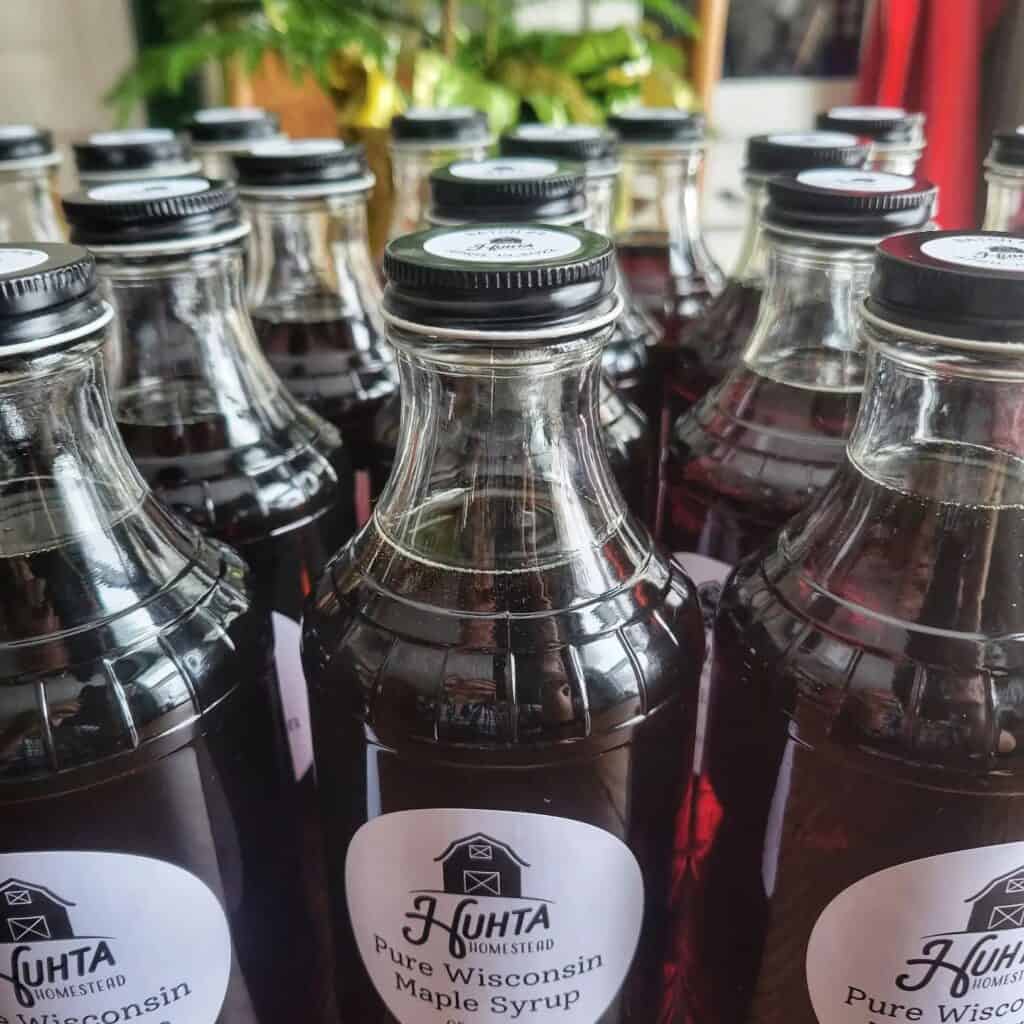
Even if their children don’t follow the farm path of their parents, Mary said the experience they are providing them will serve as a strong work-ethic foundation for whatever path they choose.
“They may not want to farm, but they will have the skills to figure out whatever they want to do,” she said.
Sustainable growth
Though she isn’t surprised they ended up with animals, Mary said they never anticipated Huhta Homestead to become what it is today.
“It’s been really exciting to watch the farm grow, especially, like I previously said, hearing how it impacts families specifically – that warms your heart a little bit,” she said.
Looking toward the future, Mary said any growth that happens will happen naturally and sustainably.
“Land-wise, we are pretty set with where we are at,” she said. “We could expand our head of cattle a little – but nothing astronomical.”
In terms of the farm’s poultry flock, Mary said “we could definitely take our poultry numbers up significantly.”
“It’s really just a matter of supply and demand in the market – and we don’t want to over-supply and undersell,” she said. “But, yeah, I’d love to grow the chicken side of Huhta Homestead.”
In addition to being a source of meat income, Mary said the chickens help with the farm’s pasture health.
“We actually pasture them in the same area that we have our cattle,” she said. “We move them once a day to a new section of grass. They get to forage around – which is healthier for them, and they also fertilize our fields. So, it’s really a win-win.”
 Making a Difference: NFL Fan of the Year Tom Grossi uses platform to give back
Making a Difference: NFL Fan of the Year Tom Grossi uses platform to give back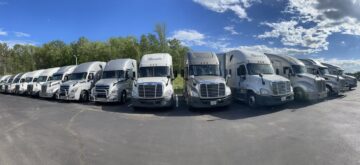 Finding a niche steers 40 years of success for Rands Trucking
Finding a niche steers 40 years of success for Rands Trucking


